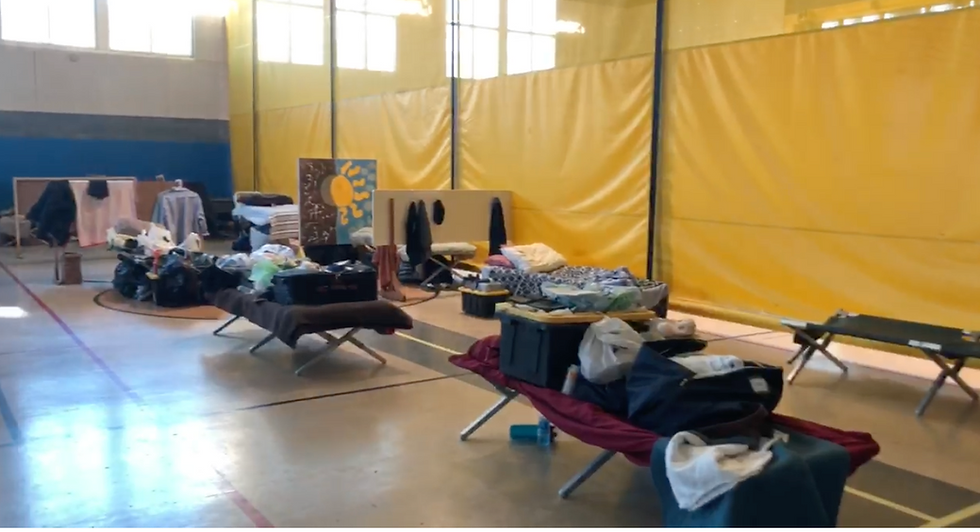The Increase of Homelessness Results in Human Trafficking Spike.
- Nov 30, 2020
- 3 min read
Updated: Dec 15, 2020
Updated: Dec. 13, 2020
Los Angeles, CA - The increase of homelessness during the COVID-19 pandemic has resulted in a serve spike of human trafficking in the Untied States. Predators are exploiting peoples economic vulnerabilities using hospitality as a weapon to enforce sex trafficking.

Photo by Andrea Esparza
The COVID-19 pandemic has amplified people's vulnerabilities. Economic uncertainty has left already disfranchised population at a higher risker of human trafficking. Monterey County social worker and Human Trafficking Committee member LeeAnne Jones says she has seen an increase in human trafficking during the pandemic. Predators are adapting to the changing circumstances. Jones said predators using various methods to feed off women and children's vulnerabilities for their benefit.
"Traffickers are using hospitality as leverage for control; desperate victims accept predators' advances mistaking their predator tactics as forms of generosity," said Jones.
Women who have accepted a favor feel trapped by their predators. They feel they must return the favor by complying with the predator's sexual requests. This situation creates a complicated power dynamic.
"When this dynamic happens, predators will say, I gave you his place to stay, so you have to do something for me. People feel grateful, or they feel kind of trapped," said Jones.
Predators thrive off manipulation and use psychological methods such as guilt tripping to get what they want.
The widespread unemployment during the pandemic has left people unable to pay rent, which is a perfect circumstance for predators to encourage sexual forms of payments. These social factors have left thousands homeless, including women and children, who are at a higher risk of human trafficking.
Homelessness leaves youth vulnerable to exploitation. Los Angeles Human Trafficking consultant Myla Lampkin said she has never seen such a spike in child trafficking in Los Angeles in her twelve-year career. She blames the pandemic and the lack of resources for this increase.
"Children are roaming the streets when they would have been at school children are at home alone if they even have one. It sad to say, but parents and family members often participate in the trafficking of their children. Families are desperate for cash and unfortunately result in child exploitation," said Lampkin.
Trafficked victims find themselves in a more difficult position. The JAMA Network stated current trafficking victims face a greater risk. The pandemic has made identifying victims even more challenging. The closure of schools reduced victims' chances of utilizing hero resources. COVID-19 has also overwhelmed hospitals, and the social distancing guidelines have interrupted the interaction between patients and medical staff, reducing the level of trust. Their motivation to come forward and report their abuse has diminished.
The homeless crisis continues to worsen and people are trying to find new ways to cope with the rising demand for shelter.
San Fernando resident Paulette Moses has dedicated her life to developing shared living spaces. Moses owns seven houses throughout the valley, providing shelter for over 49 resident who without her style of housing would be homeless.
Moses says she has noticed an increase in homelessness and more abused women have come to her seeking shelter.
"I have seen a lot of abused women with all types of the stories of survival. People are now displaced due to COVID. They are losing their homes, jobs and have nowhere to go. My style of housing provides a safe space, and there needs to be more funding and acknowledgment for this style of housing," said Moses.
Moses' calls her housing style shared living. She houses seven people in a three to four-bedroom home. She provides the best amenities possibles in hopes of aiding the homeless crisis in Los Angeles.
Homelessness and human trafficking continues to rise, and experts say the best way to aid this crisis is through education. Human trafficking consultant Lampkin stressed the public needs to learn the basic fundamentals of trafficking.
"People need to be aware that traffickers are not only on the streets. They can even be in your home and even online. Even though we are in a pandemic, programs are still in place. It is never too late to get help," said Lampkin.
Amidst the pandemic, resources are still available. If you are or know anyone who is a victim of human trafficking, contact the National Human Trafficking Hotline 1 (888) 373-7888.
Video Credit: Sky News
Video Credit: Andrea Esparza
By Andrea Esparza
With contributions from JAMA Network
Video - Sky News
Photo - Andrea Esparza
EDUCATE YOURSLEF
The Evolution of Human Trafficking During The COVID-19 Pandemic
Myths and Fact About Human Trafficking





Comments